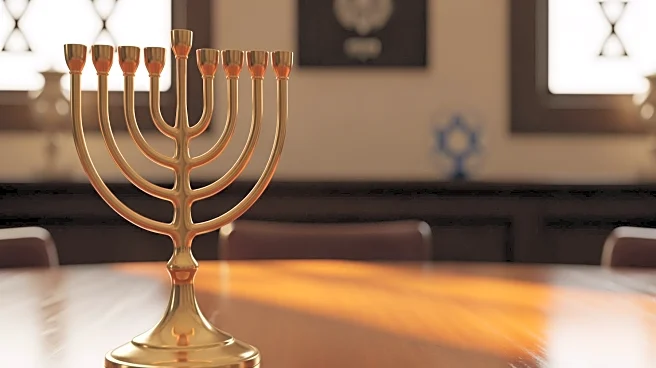What's Happening?
Rabbi Doron Perez, chair of the Modern Orthodox World Mizrachi movement, is poised to become the next president of the World Zionist Organization (WZO) following a power-sharing agreement between center-left
and center-right blocs. This development comes after a period of personal and professional upheaval for Perez, marked by the tragic loss of his son, Capt. Daniel Perez, during the Oct. 7 terror attacks. The negotiations for the WZO leadership were disrupted by internal Israeli politics, particularly the proposed appointment of Yair Netanyahu, which led to the collapse of the initial agreement. Despite these challenges, Perez remains focused on fostering unity within the Zionist movement and the Jewish community, emphasizing the need to transcend political divisions and prioritize collective healing.
Why It's Important?
The leadership transition at the World Zionist Organization is significant as it reflects broader tensions within Israeli politics and their impact on global Jewish institutions. Rabbi Perez's potential presidency could influence the WZO's role in connecting Jewish communities worldwide to Israel and Zionism. His emphasis on unity and healing is particularly relevant in the aftermath of the Oct. 7 attacks, which have highlighted the need for solidarity among Jews globally. The situation underscores the challenges faced by Jewish organizations in navigating political divisions while maintaining their mission to serve diverse Jewish communities. Perez's approach may offer a path forward in strengthening ties within the Jewish diaspora and promoting a cohesive Zionist vision.
What's Next?
As Rabbi Perez prepares to assume the presidency of the WZO, the focus will likely be on rebuilding trust and cooperation within the organization. The ongoing negotiations may lead to further adjustments in leadership roles and strategies to ensure effective governance. Perez's leadership could initiate efforts to address the perceived cronyism and bloated structure within the WZO, aiming to enhance its credibility and effectiveness. Additionally, the organization may seek to leverage the recent crisis as an opportunity to reinforce its commitment to uniting Jewish communities and fostering a stronger connection to Israel. The outcome of these efforts will be closely watched by stakeholders within the Zionist movement and the broader Jewish community.
Beyond the Headlines
The leadership changes at the WZO highlight deeper issues related to the intersection of Israeli domestic politics and global Jewish affairs. The controversy surrounding Yair Netanyahu's proposed appointment reflects concerns about nepotism and the influence of political figures on Jewish institutions. Rabbi Perez's call for unity and healing resonates with broader societal challenges, including the need to bridge ideological divides and promote inclusivity within the Jewish community. This situation also raises questions about the role of the WZO in addressing contentious issues such as the Law of Return and conversion policies, which have implications for Jewish identity and community cohesion. Perez's leadership may offer a chance to redefine the organization's priorities and strengthen its role as a unifying force.









